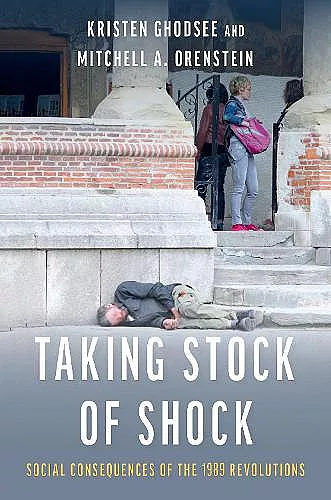Taking Stock of Shock
Social Consequences of the 1989 Revolutions
Kristen Ghodsee author Mitchell Orenstein author
Format:Paperback
Publisher:Oxford University Press Inc
Published:29th Sep '21
Currently unavailable, and unfortunately no date known when it will be back
This paperback is available in another edition too:
- Hardback£98.00was £98.00(9780197549230)

Kristen Ghodsee and Mitchell A. Orenstein blend empirical data with lived experiences to produce a robust picture of who won and who lost in post-communist transition, contextualizing the rise of populism in Eastern Europe. After the fall of the Berlin Wall in 1989, more than 400 million people suddenly found themselves in a new reality, a dramatic transition from state socialist and centrally planned workers' states to liberal democracy (in most cases) and free markets. Thirty years later, postsocialist citizens remain sharply divided on the legacies of transition. Was it a success that produced great progress after a short recession, or a socio-economic catastrophe foisted on the East by Western capitalists? Taking Stock of Shock aims to uncover the truth using a unique, interdisciplinary investigation into the social consequences of transition—including the rise of authoritarian populism and xenophobia. Showing that economic, demographic, sociological, political scientific, and ethnographic research produce contradictory results based on different disciplinary methods and data, Kristen Ghodsee and Mitchell Orenstein triangulate the results. They find that both the J-curve model, which anticipates sustained growth after a sharp downturn, and the "disaster capitalism" perspective, which posits that neoliberalism led to devastating outcomes, have significant basis in fact. While substantial percentages of the populations across a variety of postsocialist countries enjoyed remarkable success, prosperity, and progress, many others suffered an unprecedented socio-economic catastrophe. Ghodsee and Orenstein conclude that the promise of transition still remains elusive for many and offer policy ideas for overcoming negative social and political consequences.
Laudable * Anders Åslund, Europe-Asia Studies *
Ghodsee has teamed up with political scientist Mitchell Orenstein to present a comprehensive survey of all the evidence that things have gotten worse for Eastern Europe since 1989 * Helen Andrews, The American Conservative, The American Conservative *
Taking Stock of Shock results from a massive interdisciplinary endeavor, and it is a timely and crucial contribution to the debate on postsocialism. Knocking down disciplinary walls, Ghodsee and Orenstein provide a uniquely broad insight into the post-socialist landscape. This is more than merely a scholarly achievement. Building a compelling new narrative is crucial to help break down the walls of inequality and precarity that limit the actual exercise of the freedoms post-socialist citizens nominally gained when the Berlin Wall fell. * Gabor Scheiring, Review of Democracy, Review of Democracy *
Ghodsee and Orenstein have written a provocative book. Drawing on an impressive array of economic, demographic, public opinion, and ethnographic data, they critically analyze the emergence of stark inequalities that have generated tremendous hardships for many and enormous benefits for some. * Gail Kligman, Distinguished Professor of Sociology, UCLA *
From a starting point of cacophony, where different disciplines and data seem to depict the post-Soviet transition as either a grand success or an absolute failure, Ghodsee and Orenstein seam together a convincing narrative where both achievements and disappointments can coexist. The book's focus on widening inequality allows reconciling these opposing views and providing crucial insights not only for scholars of transition countries but also for observers and policymakers in other regions * Maurizio Bussolo, Lead Economist, World Bank *
The book presents many important pieces of evidence which, taken together, document the developments and the images of transformation that have led to the disillusionment of the majority of the population in the region today. It is therefore not only a valuable contribution to the transformation discussion across different academic fields but also has an appeal for general audiences. * Luboš Studený, Historie-Otázky-Problémy *
This book is highly recommendable not only for the richness of data presented but also the provocative analysis, which helps to unsettle self congratulatory accounts of the "triumph of the West." East Europeans do not like inequality and unfairness, and their voices need to be heard. * Ulf Brunnbauer, Comparative Southeast European Studies *
This extraordinary book is a thorough assessment of the post-communist transitions in twenty-nine nations of the region, written by two scholars, Kristen Ghodsee and Mitchell A. Orenstein, representing the antipodes of the methodological spectrum. Ghodsee is a cultural anthropologist whose qualitative ethnographic approach highlights the idiosyncratic nuances of the communities under investigation. Orenstein is a political scientist specializing in quantitative research in political economy on a societal and cross-national level. Each became a renowned authority in their respective fields long before they coupled their scholarly efforts at the University of Pennsylvania. Congratulations to Penn for poaching them from other fine institutions! * Krzysztof Jasiewicz, H-Net Reviews *
ISBN: 9780197549247
Dimensions: 158mm x 236mm x 18mm
Weight: 440g
300 pages